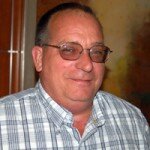
In November of 2004, Zettie Williams confronted what neurologists consider one of the most feared consequences of stroke. When a therapist showed her a photograph of her son, she knew she was looking at her son, but she couldn’t say his name.
Ms. Williams was suffering from aphasia, a language impairment that makes communication difficult. The stroke, which was caused by a blood clot, decreased the oxygen-rich blood supply to the left side of Ms. Williams’s brain. Brain cells (neurons) in an “eloquent” area that was responsible for speech and movement died as a result, leaving Ms. Williams temporarily unable to talk or walk.
In the seven years since, however, something remarkable has happened. Highly motivated, supported by faith, family and friends, and propelled by the opportunities provided by stroke researchers affiliated with the UC Neuroscience Institute, Ms. Williams has made a comeback. Although her words are not always crystal-clear and her right arm is limp, she is a picture of animation. Her communication is effective and intentional, and last year she earned her high school diploma. She lives independently in a small, comfortable apartment that she keeps spotlessly clean with determination, pride and her one good arm.
“After my stroke I didn’t know my name. I didn’t know how to spell my name,” Ms. Williams reflects. “I’m doing this good because I’ve been doing studies for seven years.”
Jerzy Szaflarski, MD, PhD, Associate Professor of Neurology at UC, sees in Ms. Williams the potential for stroke survivors to enhance their recovery if appropriate therapy can be provided. He and other researchers are working to determine what form that therapy should take and how long it should be administered.
“There are therapies that effect long-term plasticity in the brain, that create new connections in the brain and therefore potentially can have long-lasting effects on aphasia,” Dr. Szaflarski says. “As a result, these patients may get better and, thus, return to the society and participate in the society. If their aphasia is especially bad, they can’t participate in the society. That’s why it’s so important to find better ways to help.”
Dr. Szaflarski cautions that not everyone who experiences a stroke is a candidate for participation in these studies, will derive benefits similar to those derived by Ms. Williams, or will receive all the trial therapies Ms. Williams was able to receive.
Ms. Williams, who was a smoker with high blood pressure and high cholesterol prior to her stroke, says she was in her third week of hospitalization when her health insurance ran out. At that time, a UC researcher told her about studies at UC that explored how various activities might help stroke survivors improve or regain their language or motor skills. Ms. Williams enrolled in a study and never stopped.
Today she raves about the studies involving functional MRI. While she puzzled over words or sounds, pressing a blue button or a yellow, depending on the answer, a 3-tesla MRI machine took pictures of her brain in action. Afterward, she was asked to remember some of the words she had heard. “They were nouns – bed, telephone, bird, window,” Ms. Williams says with assurance. “I never missed one.”
Most recently, she spent 3½ a hours a day for two weeks engaged in a game reminiscent of “Go Fish.” During the game, Ms. Williams and two others held a handful of cards and took turns asking each other whether they had a specific picture on one of their cards. “They made us ask for the picture, and we had to make a sentence,” she explains.
Recovery continues daily at home, where Ms. Williams plays solitaire on her computer, solves word puzzles in a large workbook, and works with an aide, “who makes me use my brain when it comes to counting my money and pronouncing words correctly.” One neighbor leaves notes on her door so that she can practice her reading every day, and another walks with her through the spacious parking lot outside her apartment. A grateful survivor, Ms. Williams has begun volunteering at a local hospital.
“All because of UC and the MRI, I got my memories back,” she says. “Doing the MRI studies gave me the courage to make me want to help people like me.”
— Cindy Starr
* * *
Hope Story Disclaimer – This story describes an individual patient’s experience. Because every person is unique, individual patients may respond to treatment in different ways. Outcomes are influenced by many factors and may vary from patient to patient.







